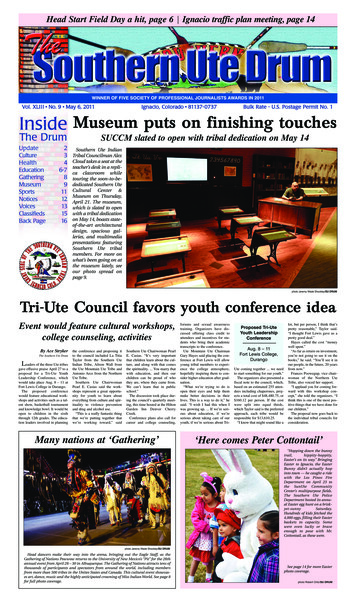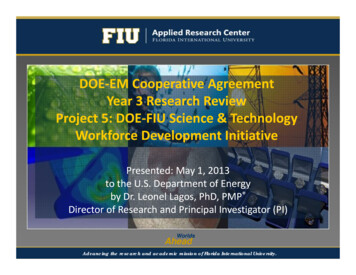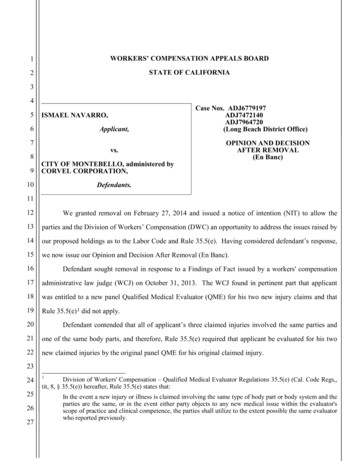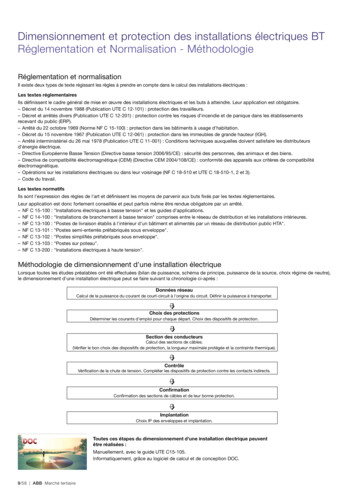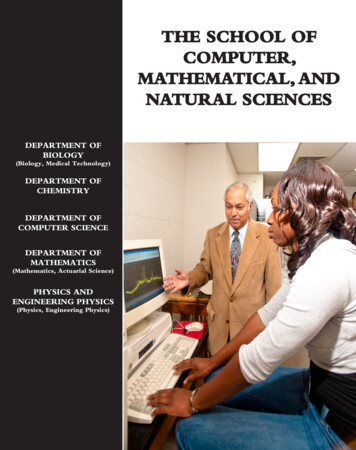
Transcription
THE SCHOOL OFCOMPUTER,MATHEMATICAL, ANDNATURAL SCIENCESDEPARTMENT OFBIOLOGY(Biology, Medical Technology)DEPARTMENT OFCHEMISTRYDEPARTMENT OFCOMPUTER SCIENCEDEPARTMENT OFMATHEMATICS(Mathematics, Actuarial Science)PHYSICS ANDENGINEERING PHYSICS(Physics, Engineering Physics)
SCHOOL OF COMPUTER, MATHEMATICAL,AND NATURAL SCIENCESSchool of Computer,Mathematical andNatural SciencesDr. Joseph Whittaker, DeanDr. Timothy Akers, Interim Associate Dean forGraduate Studies and ResearchPHILOSOPHY AND OBJECTIVESExcellence in teaching, productivity in research, andabundant student support and outreach services arebenchmarks that embrace this School’s philosophy. Together, they serve as the School’s guiding force in educating Morgan science and mathematics majors tobecome the next generation of not only scientists andmathematicians but also community and world leaders.The primary goal of the School of Computer, Mathematical and Natural Sciences is therefore to recruit andmaintain a cadre of learned, capable and dedicated faculty who are: (1) creative and innovative in theirthinking and teaching; (2) passionate and meticulous intransmitting current and relevant subject matter in theirclasses; (3) productive in creating new scientificknowledge in their research laboratories; and (4) caringand knowledgeable in their roles as faculty advisors tostudents. Toward this end and in keeping with the threepronged mission of teaching, research and service of theUniversity, the major objectives of the School are: to maintain cohesive and productive programs thatfocus on advancing frontiers in science, mathematicsand technology.to recruit and retain highly qualified and productivefaculty who demonstrate scholarly activities andcompassion in teaching students, and who also provide demonstrated service to the university and thebroader community;to recruit students with demonstrated potential forleadership, service and research roles in science andmathematics;to provide sound and up-to-date curricula that emphasize competency in the sciences and mathematicsthat can be interrelated with the various other academic disciplines;to provide an integrated core of instruction in scienceand mathematics that ensures proficiency and understanding of the basic concepts of these disciplines;to provide state-of-the-art teaching and research facilities that promote academic excellence and encourage faculty and student involvement in basicresearch; andto instill in students the desire to become scientifically and technologically literate to meet the challenges of a changing global society.Degree ProgramsThe School of Computer, Mathematical and NaturalSciences offers nine (9) undergraduate degree programsleading to the Bachelor of Science (B. S.) degree. Theyinclude degrees in Actuarial Science, Biology, Chemistry, Chemistry (Pre-Professional), Computer Science,Engineering Physics, Mathematics, Medical Technology, and Physics. In addition, the School administers a3/4-degree program in Medicine and Dentistry with theUniversity of Maryland-Baltimore Campus and a 3/4degree program in Medicine with the Boston UniversitySchool of Medicine through the Early Medical SchoolSelection Program (EMSSP). After successfully completing the fourth year in the respective 3/4-degree program, which is the first year in medical or dentalschool, students will receive a Bachelor of Science Degree from Morgan State University. Upon completionof the MD or DDS Degree program, students will beawarded the MD or the DDS degree by the respectivemedical or dental school. For example, Morgan’sCOMPUTER,MATHEMATICAL &NATURAL SCIENCESThe School of Computer, Mathematical and Natural Sciences (SCMNS) consists of the following departments:Biology/Medical Technology, Chemistry, ComputerScience, Mathematics and Physics/Engineering Physics.In addition, the School houses several science researchtraining and academic enhancement programs, an Honorsprogram, a Student Development program, a Transfer/Pre-professional program, as well as community-outreachprograms. These departments and support programs allwork in concert under the leadership of the Dean of theSchool to prepare academically sound and well-versedscience and mathematics graduates to succeed, thriveand serve in tomorrow’s changing scientific and technological world. The School also offers General EducationRequirement courses in the sciences and mathematics toall Morgan students, regardless of their major field of study. 360
361SCHOOL OF COMPUTER, MATHEMATICAL,AND NATURAL SCIENCES3/4-degree EMSSP with Boston University School ofMedicine is an accelerated program that entails three yearsof resident study at Morgan State University in which students must complete a prescribed course of study, maintain a cumulative grade point average of at least 3.5, andperform satisfactorily on the MCAT. Upon successfulcompletion of all requirements at both institutions, studentswill then be promoted to their first year of medical school.Admission to Degree ProgramsStudents who meet the admission requirements of theUniversity are eligible for admission to degree programsin the School of Computer, Mathematical and NaturalSciences. Unless specifically prohibited by Universityregulations, students should declare their majors as earlyas possible and should contact the appropriate departmentfor further directions.COMPUTER,MATHEMATICAL &NATURAL SCIENCESRetention in Degree ProgramsIn order to remain in good academic standing as majors indegree programs in the School of Computer, Mathematicaland Natural Sciences, students must meet the University’sstandards for satisfactory academic progress outlined underthe Academic Policies. According to University standards,students who attain less than a 2.0 cumulative grade pointaverage are placed on academic probation. Students onacademic probation are required to: (1) repeat all courses for which they earned less than a “C” grade, and concurrently (2) pursue no more than 13 credits until theyraise their cumulative grade point average to 2.0 or better.Students who are academically dismissed by the University for unsatisfactory progress are also dismissed as degreecandidates in their majors. Readmission to the Universityconstitutes readmission as a degree candidate in the major.the remaining twenty-five percent (25%) or less of thecourse work by the end of the next semester of their enrollment at the University. Otherwise, the “I” grade ischanged to “F.” Although a petition for “I” grade may beinitiated by the student or the faculty member, the recording of the “I” grade must be approved by the Chairpersonand the Dean. Forms are available in the Office of theDean.Academic AdvisingAcademic advising is an important part of the students’undergraduate education. In the School of Computer,Mathematical and Natural Sciences, academic advisingis high on the list of priorities and is a requirement forretention in the major. The Department Chairpersonsassign students faculty advisors from the point oftheir matriculation as majors in one of the degreeprograms in the School. Students are required to holdconferences with their faculty advisor a prescribednumber of times per semester, depending on theirclassification and/or their academic standing.Office of Student DevelopmentThe Office of Student Development focuses on improving student success, student retention and graduation rates. This Office provides materials andworkshops covering academic skills-building viatutorials, time management and test taking strategies,and career opportunities for all SCMNS students.Requirements for GraduationStudents earning degrees in the School of Computer,Mathematical and Natural Sciences must meet thefollowing graduation requirements:(1)Grade Change PolicyThe School of Computer, Mathematical and Natural Sciences adheres strictly to the university policy concerninggrade change. It does not make any exceptions to this policy.“I” Grade Policy“Incomplete” (“I”) is given in exceptional cases to students who have satisfactorily completed at least seventyfive percent (75%) of the course requirements, and, dueto documented illness or other documented emergenciesbeyond their control, have been unable to complete therequirements for the course. Students must complete(2)GENERALEDUCATIONREQUIREMENTS: In order to qualify forgraduation, students must complete thecourses outlined as “General EducationRequirements” and “Requirements forGraduation” in the University catalog.COMPLEMENTARY STUDIES: All studentsearning degrees in programs in the School ofComputer, Mathematical and Natural Sciencesmust complete a six-credit ComplementaryStudies Program of two (2) three-credit coursesdesigned to complement the General Education Requirements and to broaden their college exposure. Courses used to meet theComplementary Studies requirement may not be
SCHOOL OF COMPUTER, MATHEMATICAL, AND NATURAL SCIENCESused simultaneously to satisfy other requirements. Inorder to qualify for graduation, students must complete one (1) of the following Complementary Studiesoptions:Option 1: One of the following three pairs ofcourses(take only courses in the same horizontal pair to receivecredit)PHIL 300 and PHIL 406 ETHICSPHIL 304 and PHIL 498 LOGICBUAD 200 and BUAD 381 BUSINESS andFINANCEOption 2: One of the following three pairs ofcourses(3)(4)(5)(take only courses in the same horizontal pair to receivecredit)GENL 396 and GENL 496 SERVICE LEARNINGGENL 397 and GENL 497 FINE ARTSGENL 398 and GENL 498 GREAT BOOKSGENL 399 and GENL 499 GREAT ISSUESMATH 399 MATHEMATICS IN AFRICANCULTUREPHYS 311 ACOUSTICS AND YOUPHYS 309 HISTORY AND PHILOSOPHY OFSCIENCEPHYS 310 ASTRONOMY AND SPACESCIENCEREQUIRED AVERAGE: In order to qualifyfor graduation, students must have earned acumulative average of 2.0 or better, must havea major average of 2.0 or better, and must haveno outstanding grades below “C” in the major(which includes all required courses taken inthe major and required supporting courses).JUNIOR-AND SENIOR-LEVEL COURSES: In order to qualify for graduation, students must have taken two-thirds of theirjunior- and senior-level (300 and 400 level) requirements in the major at MorganState University, unless granted prior writtenpermission by the Dean to take courses elsewhere.SENIOR COMPREHENSIVE EXAMINATION: In order to qualify for graduation, studentsmust pass the Departmental Senior Comprehensive Examination with a score of 70 or higher.OTHER SCHOOL-WIDE POLICIES(1)Option 4: Foreign LanguagesA six-credit two-course sequence of the sameforeign language.Option 5A six-credit complement to the majorconsisting of two (2) three-credit courses in thesame discipline from the College of LiberalArts at the 300 or 400 level. ENGL 350WRITING PRACTICUM cannot be used to satisfy this requirement.MAJOR REQUIREMENTS: In order toqualify for graduation, students must completethe requirements specified in the programs inwhich they are majoring.(2)INDEPENDENTSTUDY: TheSchool of Computer, Mathematical and NaturalSciences approves independent study for students only when the course has not been offeredregularly enough for the student to completedegree requirements within the statute of limitations. In addition, the School does notapprove independent study for students whohave taken the course previously and failed it.TAKING COURSES AT OTHER INSTITUTIONS: Once students have matriculatedat Morgan State University, they may not takecourses at other institutions for the purpose oftransferring them to Morgan, without prior written permission from the Dean of the School ofComputer, Mathematical and Natural Sciences.Once prior written permission has been given,students may transfer credits, but not grades, forthose courses to Morgan. As a general rule, theSchool of Computer, Mathematical and NaturalSciences does not grant permission for studentsCOMPUTER,MATHEMATICAL &NATURAL SCIENCESOption 3: Any two of the following courses(6)362
363(3)COMPUTER,MATHEMATICAL &NATURAL SCIENCES(4)(5)(6)SCHOOL OF COMPUTER, MATHEMATICAL, AND NATURAL SCIENCESto take a course at another institution if students have taken and failed the same course atMorgan or if students have a cumulative gradepoint average of less than 2.0. In addition, it doesnot permit students to take courses at anotherinstitution if the same courses are being offeredat Morgan during that semester or session. Thispolicy applies to CO-OP programs, as well.EXCESS CREDITS: The School of Computer, Mathematical and Natural Sciences adheresstrictly to the university policy concerninggranting permission to take excess creditsduring any semester. It does not make exceptions for the purpose of enabling seniors tograduate. The Dean grants permission to pursue excess credits only to students with acumulative average of 3.0 or higher.STATUTE OF LIMITATIONS ON TRANSFER EVALUATIONS: Transfer students admitted to a program in the School of Computer,Mathematical and Natural Sciences must appealthe evaluation of their transfer credits within one(1) year of the date on which the transferevaluation is issued to them. After that date,the evaluation becomes permanent, and it maynot be challenged later for the purpose ofmeeting requirements for graduation.REPEATING COURSES TRANSFERREDTO THE UNIVERSITY: Students whorepeat Morgan courses for which they havebeen given transfer credit will automaticallylose those corresponding transfer credits. Oncethe course has been taken at Morgan, it willnot be expunged from the record.FAMILIARITY WITH ACADEMIC POLICIES: In the School of Computer, Mathematical and Natural Sciences, students are held responsible for being knowledgeable of published policies and procedures at the University. Under no circumstances will ignorance ofpublished policies and procedures be acceptedas a reason for making exceptions to them.SCMNS FRESHMAN ORIENTATIONSCM(ORNS) PROGRAMORNS 106 FRESHMAN ORIENTATION FORMAJORS IN THE SCHOOL OF COMPUTER,MATHEMATICAL AND NATURAL SCIENCES— Two hours; 1 credit. This course introduces studentsto the expectations and demands of higher education, tothe legacy and tradition of Morgan State University, tocollege survival strategies, and to the broad array of career opportunities in the science, mathematical andtechnological fields. Students enrolled in this class arerequired to attend all university convocations and otherprescribed extra-curricular activities. They are alsorequired to hold conferences with their faculty advisorsin order to pass the course. Students transferring 24 ormore credits to the university when admitted are exempted from this requirement. (FORMERLY ORIE 106)The SCMNS Honors Program is designed to provide promising and highly motivated undergraduate students, whohave been officially admitted to the Morgan State UniversityHonors Program, increased opportunities to broaden andenrich their academic exposure and accelerate their preparedness for graduate and professional studies. It enableshonors science and mathematics majors to become membersof a close-knit community of faculty and academically talented students, who are committed to intellectual pursuits.SCMNS HONORS PROGRAMTo participate in the SCMNS Honors Program, astudent must be a Science or Mathematics major whohas been admitted to the Morgan State UniversityHonors Program. Full participation in the HonorsProgram requires that a student complete the following: Enroll in and complete an SCMNS Honors Seminarat each undergraduate level. Actively participate in all SCMNS Honorsextra-curricular activities, including colloquia, fieldtrips, and tutorials. Maintain membership in the Morgan State UniversityHonors Program. Complete an Honors thesis on which work is begunduring the fall semester of the junior year.
BIOLOGYCOURSE OFFERINGSThe following courses are offered by the interdisciplinary faculty of the School of Computer, Mathematicaland Natural Sciences:HONR 106 – FRESHMAN HONORS COLLOQUIUMTwo hours; 2 credits. —The purpose of this course is toenhance the freshman year experience of Science Honors Program students by encouraging them to think broadly aboutthe personal and social values of a scientific education andabout what it means to be an educated person. This coursemay be substituted for ORNS 106. (FALL/SPRING).HONR 206–SOPHOMORE HONORS COLLOQUIUM—Two hours; 2 credits. This course is designed to enrich the thinking of SCMNS Honors Program studentsby introducing them to research projects and otherscholarly endeavors currently being conducted bySCMNS faculty members. (FALL/SPRING).BIOLOGYActing Chairperson of Department: Associate ProfessorERNEST C. STEELE, JR.; Professors: GLORIA E.HOFFMAN, KENNETH P. SAMUEL, ARTHUR L.WILLIAMS; Associate Professors: LISA BROWN,FRANK DENARO, CHUNLEI FAN, CHRISTINE F.HOHMANN, CLEO HUGHES-DARDEN, MICHAELKOBAN, SAROJ PRAMANIK, GERALD RAMEAU,JAMES WACHIRA, JONATHAN WILSON - Directorof the Baltimore Urban Systemic Initiative; AssistantProfessors: ROSELYN B. HAMMOND, GABRIELLEMcLEMORE, ERIKA WHITNEY; Lecturers: DALEEMEAGWALI, MITCHELL GRAHAM, DWAYNEHILL, SANJEEDA JAFAR, HARUNA SESAY;Research Assistant Professor: WEI-WEI LE.MISSION OF THE DEPARTMENTThe overall mission of the Biology Department is toprovide high quality instruction coupled with researchexperiences to augment the fundamental principles andtheories of the biological sciences.OBJECTIVES OF THE DEPARTMENTThe objectives of the Biology Department are:1.2.3.4.To train the student in the fundamentalconcepts and principles of biology through theapplication of the scientific method;To develop skills in reading and writing biological science materials and communicating ideasand concepts in biological science clearly andlogically;To develop laboratory skills which are necessary to understand and demonstrate biological principles of importance; andTo develop an intellectual and creativeappreciation of living things as objects ofbeauty and products of years of adaptation tothe environment through evolution.THE MAJOR IN BIOLOGYSchool RequirementsIn addition to meeting the requirements in General Education and in the major, students must also complete six(6) credits in the Complementary Studies Program requiredof all majors in the School of Computer, Mathematicaland Natural Sciences. Options for satisfying this requirement are outlined under the section on the Schoolof Computer, Mathematical and Natural Sciences. Also,in order to qualify for graduation, students must pass theSenior Departmental Comprehensive Examination as wellas the Speech and Writing Proficiency examinations; musthave taken all of their junior-and senior-level requirements in the major at Morgan (unless granted prior writtenpermission by the Dean to take courses elsewhere); andmust have earned a cumulative average of 2.0 or betterand a major average of 2.0 or better, with no outstandinggrades below “C” in the major (which includes all coursesrequired for the major and required supporting courses).Required Courses for the Major in BiologyIn order to satisfy requirements for the major in Biology,students must complete the courses listed below. Studentsare expected to complete the core courses in Biology(105-106, 204-205, 303, 310 and 453) by the end of the Junior year. In the Senior year, they are to select a minimumof eight (8) credits from courses numbered BIOL 400 ANDHIGHER TO COMPLETE THE MAJOR REQUIREMENTS. BIOL 450-451 may not be used to satisfy the400 level biology requirement. Students should note thatCOMPUTER,MATHEMATICAL &NATURAL SCIENCESHONR 306–HONORS THESIS SEMINAR—Twohours; 2 credits. This course is a workshop on technicalwriting geared toward getting SCMNS Honors Programstudents started on their Honors thesis. It includesdiscussions of library resources, prudent use of theinternet, and data analysis. (FALL/SPRING).364
365BIOLOGYMATH 241 and 242 are prerequisites for PHYS 205:BIOL 106(or BIOL 112)BIOL 204BIOL 205BIOL 303BIOL 310BIOL 453BIOL XXXCHEM 106(or CHEM 112)Introductory Biology II (majors only) orHonors Introductory Biology II4Developmental Biology4Ecology and Adaptations4Genetics4Cell and Molecular Biology4Scientific Communication2Biology Electives 400 ***8Principles of General Chemistry or4General Chemistry andQualitative Analysis (Honors)**4CHEM 203Organic Chemistry I5CHEM 204Organic Chemistry II5PHYS 203General Physics I oror 205University Physics I*, **4/5PHYS 204General Physics II oror 206University Physics II*, **4/5MATH 114Introduction to Mathematicalor higher*Analysis II or higher4Foreign Lang. 203 French, Spanish or German3Foreign Lang. 204 French, Spanish or German3COSC 110Introduction to Computing3(or higher)COMPUTER,MATHEMATICAL &NATURAL SCIENCESCourseDescriptionCreditsTOTAL CREDIT HOURS65/67In addition, students must take the following courses tosatisfy the appropriate areas of General EducationRequirement:REQUIRED GENERAL EDUCATION COURSESBIOL 105Introductory Biology for Majors I or(or BIOL 111)** Honors Introductory Biology ICHEM 105Principles of General Chemistry I or(or CHEM 111)** General Chemistry (Honors)MATH 113Introduction to Mathematicalor higherAnalysis I or higher**TOTAL CREDIT HOURS44412*MATH 241 and 242 are prerequisites for PHYS 205 and 206.** The two courses chosen in each area must be sequential.*** Exclusive of BIOL 450-451.The total number of Biology credits taken to satisfy themajor must total 65/67. In addition, students are expectedto complete all Biology courses except the Biology Electives by the end of the junior year.Honors Curriculum in BiologyIn order for Honors Biology majors to satisfy theirbiology requirements in the Honors Program, they mustcomplete the courses listed below: Biology 111 - 112(versus BIOL 105 - 106) and BIOL 455.ADDITIONAL REQUIREMENTS FOR MARCSTUDENTS: Students in the MARC Program must takeBIOL 452, BIOL 454, BIOL 455, MATH 241 and MATH242.The Minor in BiologyStudents minoring in Biology must complete thefollowing course requirements:BIOL 101-102or BIOL 105 -106BIOL 204BIOL 205BIOL 303TOTAL CREDITSIntroductory BiologyDevelopmental BiologyEcology and AdaptationGenetics844420Minority Access to Research Careers Undergraduate*Scholars Training in Academic Research (MARC-U*STAR)UNDERGRADUATE RESEARCH PROGRAMSThe MARC program is an Undergraduate ScholarsTraining Program in Academic Research funded by agrant from the National Institute of General MedicalSciences (NIGMS) in collaboration with other institutesof the National Institutes of Health.Morgan State University is one of over 60 colleges anduniversities that has been awarded funds for a MARCU*STAR program. The program provides research trainingsupport for underrepresented minority (African-Americans,Native Americans, Hispanics and Pacific Islanders) students to prepare them better to successfully compete forentry into graduate programs leading to the Ph.D. degreein the biomedical sciences. Selected honors students pursueintensified courses of study as Biology, Chemistry, Physicsor Psychology majors. Each trainee must have an expressedinterest in graduate study toward the Ph.D. degree. TheMARC program is coordinated through the Departmentof Biology. MARC Faculty in the Department of Biology include: Drs. Arthur Williams, Christine Hohmann,Cleo Hughes-Darden, Kenneth Samuel, Michael Koban,Ernest Steele, Lisa Brown, Dwayne Hill, Saroj Pramanik,James Wachira, Gloria Hoffman and Erika Whitney.
BIOLOGYMinority Biomedical Research Support(MBRS) Research Initiative for ScientificEnhancement (RISE) ProgramThe MBRS RISE Program is a biomedical researchsupport program funded by a grant from the NationalInstitute of General Medical Science (NIGMS) that isgeared to increasing the number of minority scientistsengaged in biomedical research. It enables faculty andstudents at Morgan State University to participate inbiomedical research. MBRS faculty in the Departmentof Biology include: Drs. Arthur Williams, ChristineHohmann, Cleo Hughes-Darden, Michael Koban, LisaBrown, Dwayne Hill, Saroj Pramanik, James Wachira,Gloria Hoffman, Ernest Steele and Kenneth Samuel.BIOLOGY COURSES OFFERINGSBIOL 102 INTRODUCTORY BIOLOGY II— Threehours lecture, three hours laboratory; 4 credits. This coursecovers the biology of plants, animal development, animal form and function, and basic principles of evolution,and is designed for non-majors only. (FALL/SPRING).BIOL 105 INTRODUCTORY BIOLOGY FORMAJORS I—Three hours lecture, three hours laboratory; 4 credits. This course involves the study of thefundamental principles and concepts of biology withemphasis on molecular and cellular biology and is designed for biology majors only. (FALL/SPRING).BIOL 106 INTRODUCTORY BIOLOGY FOR MAJORS II— Three hours lecture, three hours laboratory; 4credits. This course is a continuation of BIOL 105. Topics covered include the biology of plants, animal development, animal form and function, and basic principlesof heredity and evolution biology. It is designed for biologymajors only. Prerequisite: BIOL 105. (FALL/SPRING)BIOL 111 HONORS INTRODUCTORY BIOLOGYI —Three hours lecture, three hours laboratory; 4 credits.This course involves the study of the fundamental principles and concepts of biology with emphasis on molecularand cellular biology, and is designed for students in theHonors Program only. This course will include supplemental lectures by visiting scientists, journal articlereadings and student presentations. (FALL/SPRING).BIOL 112 HONORS INTRODUCTORY BIOLOGYII— Three hours lecture, three hours laboratory; 4credits. This course is a continuation of BIOL 111.Topics covered include biology of plants, animal development, animal forms and function, and basic principlesof heredity and evolution biology. It is designed for students in the Honors Program only. This course will include supplemental lectures by visiting scientists, journalarti-cle readings and student presentations. (SPRING).BIOL 200 INTRODUCTION TO MEDICAL TERMINOLOGY— Two hours lecture; 2 credits.(Required for Medical Technology majors only)Emphasis will be on Greek and Latin word roots,eponym and modern medical terms. (FALL).BIOL 201 ANATOMY AND PHYSIOLOGY I— Twohours lecture, four hours laboratory; 4 credits.) (Majorcredit not given). This is a course in human anatomy andphysiology. Consideration is given to the cells, tissues, andorgans of the body and their relation to the skeletal, muscular, nervous and endocrine systems and their integration.Prerequisites: BIOL 101-102 or BIOL 105-106. (FALL).BIOL 202 ANATOMY AND PHYSIOLOGY II —Two hours lecture, four hours laboratory; 4 credits.(Major credit not given). This course is a continuationof BIOL 201 with emphasis on the circulatory,respiratory, digestive, urinary, and reproductive systemsand their integration. Prerequisites: BIOL 101-102 orBIOL 105-106, and BIOL 201. (SPRING).BIOL 204 DEVELOPMENTAL BIOLOGY— Twohours lecture, four hours laboratory; 4 credits. This courseserves basically to introduce the student to the principles,processes and problems of embryonic development inanimals. It also includes discussions and analyses of selected topics in developmental biology. Prerequisites:BIOL 101-102 or BIOL 105-106. (FALL/ SPRING).BIOL 205 ECOLOGY AND ADAPTATIONS — Twohours lecture, four hours laboratory; 4 credits. This courseis an analysis of the environmental factors affecting the evolution, adaptation, distribution and functional processes ofplant and animal communities. Considerable emphasis willbe placed on the Eco-system Concept. (FALL/SPRING).COMPUTER,MATHEMATICAL &NATURAL SCIENCESBIOL 101 INTRODUCTORY BIOLOGY I—Threehours lecture, three hours laboratory; 4 credits. Thiscourse involves the study of the fundamental principles andconcepts of biology with emphasis on molecular, cellularbiology, and heredity and is designed for non-majors only.(FALL/SPRING).366
367BIOLOGYBIOL 208 THE BIOLOGY AND CHEMISTRY OFSTREAMS – Three hours lecture and three hours laboratory; 4 credits. This is a laboratory course in whichstudents will study the effect of nutrients, urban sprawl,and storm water runoff on Herring Run Stream. (FALL).BIOL 303 GENETICS — Three hours lecture,three hours laboratory; 4 credits. This course willcover fundamental principles of each of the threebranches of genetics: classical/transmission, molecularand population, and will supplement the theoreticalconcepts given in lectures with practical laboratory experiences and genetics problem sets. (FALL/SPRING)COMPUTER,MATHEMATICAL &NATURAL SCIENCESBIOL 308 HUMAN PHYSIOLOGY — Two hourslecture, four hours laboratory; 4 credits. This is a onesemester course in human physiology, emphasizing thefunction of the organs and organ systems of the humanbody. Prerequisites: BIOL 101-102. (SPRING).BIOL 310 CELL AND MOLECULAR BIOLOGY— Three hours lecture, three hours laboratory; 4 credits. This is a one-semester course in cellular and molecular biology emphasizing membrane structure and function, structure of genetic material, control of gene expression and protein synthesis, cell division and differentiation. Prerequisite: CHEM 203. (FALL/SPRING).BIOL 401 ENVIRONMENTAL HEALTHSCIENCE— Three hours lecture, three hours laboratory; 4 credits. This course is designed to providestudents with an understanding of how pollutantsand toxic substances affect the function of biological systems. Prerequisites: BIOL 101-102 or BIOL105-106, BIOL 205 and CHEM 101 or 102 or 105 or 106.BIOL 404 HISTOLOGY AND MICROTECHNIQUE— Three hours lecture, three hours laboratory; 4 credits.This course is a microscopic study of cells, tissues, andorgans for preparing slides and the use of electron micrographs utilizing animal and/or plant tissues. (SPRING).BIOL 405 MICROBIOLOGY — Two hours lecture,four hours laboratory; 4 credits. This course offers astudy of the fundamental concepts and techniques ofmicrobiology, bacterial anatomy and physiology, principles of microbial growth, nutrition, and metabolism.Prerequisite: CHEM 101 or 105. (FALL/SPRING).BIOL 406 IMMUNOLOGY AND SEROLOGY —Two hours lecture,
TO THE UNIVERSITY: Students who repeat Morgan courses for which they have been given transfer credit will automatically lose those corresponding transfer credits. Once the course has been taken at Morgan, it will not be expunged from the record. (6) FAMILIARITY WITH ACADEMIC POLI-CIES: In the School of Computer, Mathemati-


